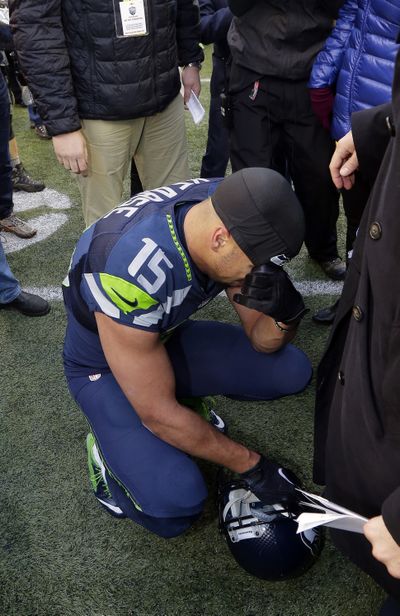Seahawks’ Jermaine Kearse was there when it counted

RENTON, Wash. – Jermaine Kearse was having an NFC championship game to forget.
The first two times Kearse even got his fingers on a pass from Seattle quarterback Russell Wilson, the ball ended up in the hands of a Green Bay defensive back. Those two deflected interceptions were sandwiched around two other attempted passes from Wilson to Kearse that were also picked off.
Four targets. Four interceptions. Four miserable moments for Kearse and the Seahawks.
“I just told myself not to feel sorry for myself, to keep pushing through,” Kearse said. “Things aren’t always going to be perfect, things aren’t always going to go your way, but it tells a lot about a person’s character on how they respond when things aren’t going well. Things are easy when things are going well, but how do you respond when they’re not?”
Kearse’s response was a moment that will be remembered in Seattle Seahawks history in the same regard as Richard Sherman’s deflection in the NFC championship game against San Francisco a year earlier. In the same end zone as Sherman’s play, Kearse caught Wilson’s 35-yard TD toss 3:19 into overtime to send Seattle to its second straight Super Bowl.
Wilson noticed Green Bay with all of its defenders near the line of scrimmage and no safety covering the middle of the field. He made a check with Kearse, who also noticed the coverage. Kearse’s job was simply to beat cornerback Tramon Williams to the inside, keep position to the post and wait for Wilson’s pass to arrive.
“I’ve seen him make so many plays before. When you see a guy that makes so many plays in practice, so many plays throughout big-time games, NFC championship game last year … Doug Baldwin, too, you just continue to trust those guys,” Wilson said. “They show me every day in practice and so when somebody messes up or I mess up or don’t throw the ball right, whatever happens, I’m just going to keep coming back to them.
“That was the first thing I told Kearse after that last interception. I said, ‘Hey, we’re going to win this game. I’m going to keep coming back to you and we’re going to find a way to win the game.’ That’s what we were able to do.”
Two of the four interceptions that were intended for Kearse were Wilson’s fault. He underthrew Kearse on a deep pass into double coverage early in the second quarter and later was short with a throw to the front corner of the end zone. Seattle coach Pete Carroll said he believed Wilson misjudged the wind on both of the underthrown passes.
But the other two interceptions hit Kearse in the hands. The most costly – it appeared – was the pass that was deflected to Green Bay safety Morgan Burnett with 5:04 left and Green Bay holding a 19-7 lead. Kearse couldn’t even get to all the negative reactions on Twitter from the first four quarters. There was too much praise for his one catch of the day.
“I couldn’t even get to the bad stuff,” Kearse said. “I don’t worry about all that stuff – it just comes down to us as a team.”
Kearse is riding an impressive postseason streak. He caught what eventually became the winning points in last year’s NFC title game against San Francisco, on a 35-yard TD in traffic on fourth down.
In the Super Bowl, Kearse bounced off Denver defenders like a pinball for a 23-yard touchdown in the third quarter of Seattle’s blowout coronation.
And in the divisional round win over Carolina this year, Kearse had a career high in yards. Kearse had three receptions for 129 yards against the Panthers, including a one-handed grab on his 63-yard touchdown catch.
But the importance of his catch Sunday boosts that to the top of special postseason moments for Kearse – even if he sent the ball flying into the stands.
“That throw was more so a sign of frustration. Just letting (out) a lot of frustration throughout that whole game,” Kearse said. “I tried to throw it as far as possible.”